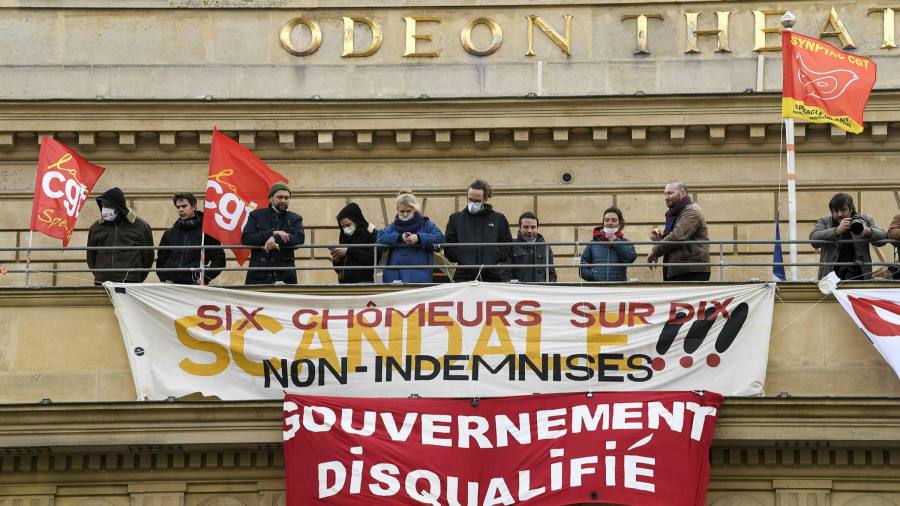[ad_1]
When 50 actors and musicians showed up at the Théâtre de l’Odéon in Paris last week, they were not there to rehearse or perform, but rather to occupy the premises.Â
Carrying bags stuffed with food and supplies, they came to protest against the plight of artists who are struggling a year into a pandemic that has closed concert halls, theatres, and cinemas across France.
Their choice of venue was no accident — it recalled May 1968 when hundreds of students, artists, and activists took over the ornate neoclassical Odéon and used it as a base for a protest movement that swept the French capital.
The Odéon protesters want the government to set a timetable for reopening cultural life, arguing that its decision to allow stores, malls, and offices to stay open while keeping the arts off limits was stifling French citizens’ souls.
They are also angry at the government’s recent decision to go ahead with plans to overhaul a generous unemployment system that protects artists when they are between jobs and want it withdrawn.
Karine Huet, a musician and activist with the CGT trade union that organised the occupation — which has since spread to 15 other theatres from Toulouse to Strasbourg — said they had no intention of leaving until the government met their demands.Â

“We can keep this up for a while,†she said. “We brought a percussion set, musical instruments, and a big sound system. I joked that we are the only jazz club open in France right now.â€
At night, she and her fellow protesters crash on air mattresses on the floor and they are sharing one shower between them.
Anger in the French arts sector has been growing for months. Many performers say they feel forgotten by President Emmanuel Macron, who despite dabbling in acting as a youth and being a theatre buff, has prioritised business over culture in the fight against the pandemic.Â
After closing for a period in spring 2020, performing arts venues were closed again in late October when the second national lockdown began. An initial target for theatres to reopen in mid-December was soon scrapped when infections remained far higher than hoped. Since then the country has remained under a national 6pm to 6am curfew with restaurants, bars, and gyms still closed, although schools are open.

“Work, consume, and shut up,†read one sign held up by a protester on Thursday that also featured a weeping Marianne, the symbol of the French Republic. Another banner depicted Macron as a cross between a red devil and a coronavirus molecule — complete with spike proteins in the place of his hair.
France’s social safety net for artists, stage hands, and technicians working in cinema — known as the régime des intermittents — is among the most generous in the world.Â
Created in 1936 in an effort to attract workers to the growing cinema business, the system treats creatives and technicians in the performing arts as salaried workers entitled to cash support even during periods when they are not working. In 2019, 276,000 people benefited from the system at a cost of €2.5b, according to a government report.

Despite the protesters’ anger, the government has provided support for artists, musicians and technical staff in the performing arts since the pandemic began. It declared last year a “free year†for people on the intermittent du spectacle system of unemployment, meaning no one would get cut off for not working enough because of the closures caused by the pandemic. The protesters want the scheme extended for another year, and the government has said it is studying the matter.
Roselyne Bachelot, the culture minister, visited protesters at the Odéon last Saturday and said she “understood their concerns†and that her goal was “to continue to protect artistic employment as much as necessary.†She was less charitable a few days later when she called the occupation of theatres “pointless†and “dangerous†in testimony before the Senate.
Prime minister Jean Castex addressed the Odéon activists via video conference on Thursday to try to find a resolution to the stand-off. He later announced 20m in additional spending for the arts sector, on top of the 30m already planned for this year in the government’s economic stimulus plan, among other measures.
The CGT union’s response was swift: “It is not with such token measures that you extinguish a social movement. Occupy! Occupy! Occupyâ€
[ad_2]
Source link





